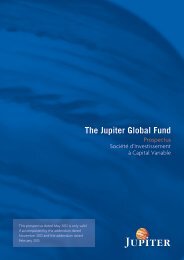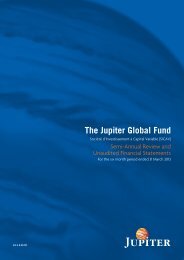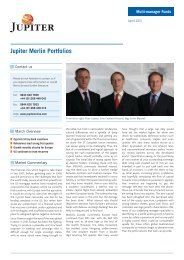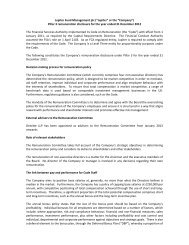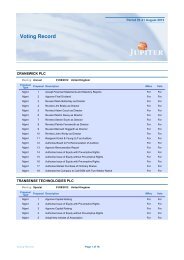The Jupiter Global Fund - Jupiter Asset Management
The Jupiter Global Fund - Jupiter Asset Management
The Jupiter Global Fund - Jupiter Asset Management
Create successful ePaper yourself
Turn your PDF publications into a flip-book with our unique Google optimized e-Paper software.
the jupiter global fund<br />
<strong>Jupiter</strong> Japan Select<br />
■■<strong>Jupiter</strong> Japan Select Review of Portfolio as at 30 September 2012<br />
Performance<br />
NAV 30.09.12 30.09.11 % Change<br />
Class L US Dollar Shares USD 11.06 USD 11.25 (1.69)%<br />
Class L Euro Shares EUR 11.86 EUR 11.54 2.77%<br />
Class L Sterling Shares GBP 11.02 GBP 11.78 (6.45)%<br />
Performance Review<br />
Over the year to 30 September 2012, the <strong>Fund</strong> fell 1.7% in US dollar<br />
terms, performing in line with its benchmark, the Topix, which also<br />
fell 1.7%.<br />
Market Review<br />
<strong>The</strong> Japanese economy recovered from the tsunami-induced<br />
recession with many industries quickly overcoming supply chain<br />
problems, despite persistent power shortages in the Tokyo area.<br />
Nevertheless, the Japanese market remained weak early in the year<br />
under review as exporters were affected by external factors such as a<br />
eurozone crisis, slower global growth, the yen’s relentless strength<br />
and floods in Thailand where many Japanese manufacturers have a<br />
significant production base.<br />
Japanese equities rallied in early 2012, helped by the yen’s weakness<br />
after the Bank of Japan adopted an explicit inflation target for the first<br />
time and increased its quantitative easing programme. However, the<br />
market lost all the gains by the end of May mainly due to the yen’s<br />
strength as a deepening eurozone crisis fuelled investors’ flight to the<br />
safe-haven currency. Japanese equities became range-bound after<br />
that, affected by concerns over China’s economic slowdown and<br />
anti-Japan protests due to the disputed Senkaku islands. Once again,<br />
domestically-oriented stocks outperformed their more export-focused<br />
peers at this time.<br />
Policy Review<br />
<strong>The</strong> <strong>Fund</strong>’s performance was supported by its focus on domestic<br />
stocks such as Astellas Pharma, housing products maker LIXIL<br />
(formerly JS Group), Sumitomo Mitsui Financial, TV broadcaster Fuji<br />
Media and internet services company Bit-isle. Not holding electric<br />
utilities was also positive for performance as they were affected by<br />
concerns over post-Fukushima maintenance costs. Among exporters,<br />
stock selection in the chemicals sector contributed positively, with<br />
our holdings in Nissan Chemical and Nitto Denko making<br />
strong contributions.<br />
Meanwhile, stock selection in the telecoms sector detracted from<br />
performance as we were overweight in NTT DoCoMo which<br />
underperformed, while we sold out of Softbank which later outperformed.<br />
Among companies that rely on domestic demand, we initiated holdings<br />
in LIXIL, Bit-isle and bicycle retailer Asahi. We also added investment<br />
in selected exporters and cyclical stocks as the polarisation in the<br />
market performance pushed their valuations to extremely low levels.<br />
We established a new position in auto parts maker Denso, taking<br />
advantage of its share price weakness.<br />
Investment Outlook<br />
Japanese equities have underperformed most of their global peers in<br />
recent months, affected by concerns about falling demand from China.<br />
Investors have been alarmed by anti-Japanese riots in China and the<br />
frosty rhetoric from the Chinese government regarding the Senkaku<br />
Islands. Trade flows between the two economies are massive and<br />
crucial for both parties and we believe diplomats will strive to cool the<br />
dispute before any serious economic damage is sustained.<br />
Domestically, the main opposition LDP has recently chosen a former<br />
prime minister, Shinzo Abe, as its leader. Current Prime Minister Noda<br />
and his party, the DPJ, are hugely unpopular and the LDP is expected<br />
to win the next general election, or it may form a coalition with the new<br />
Japan Restoration Party headed by Mayor of Osaka Toru Hashimoto.<br />
Abe is a strong proponent of ridding Japan of deflation and an Abe<br />
administration is likely to install a dovish governor of the Bank of<br />
Japan who would propose more aggressive monetary easing.<br />
Rarely has a political change been good for Japanese equities, mainly<br />
because the superficial switches of personnel have led to almost no<br />
genuine action. However, a resounding LDP win at the next election<br />
should mean a more positive political environment for equities – it is<br />
indeed hard to believe that it could be much worse.<br />
Simon Somerville<br />
30 October 2012<br />
65



